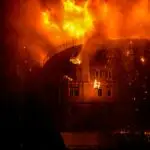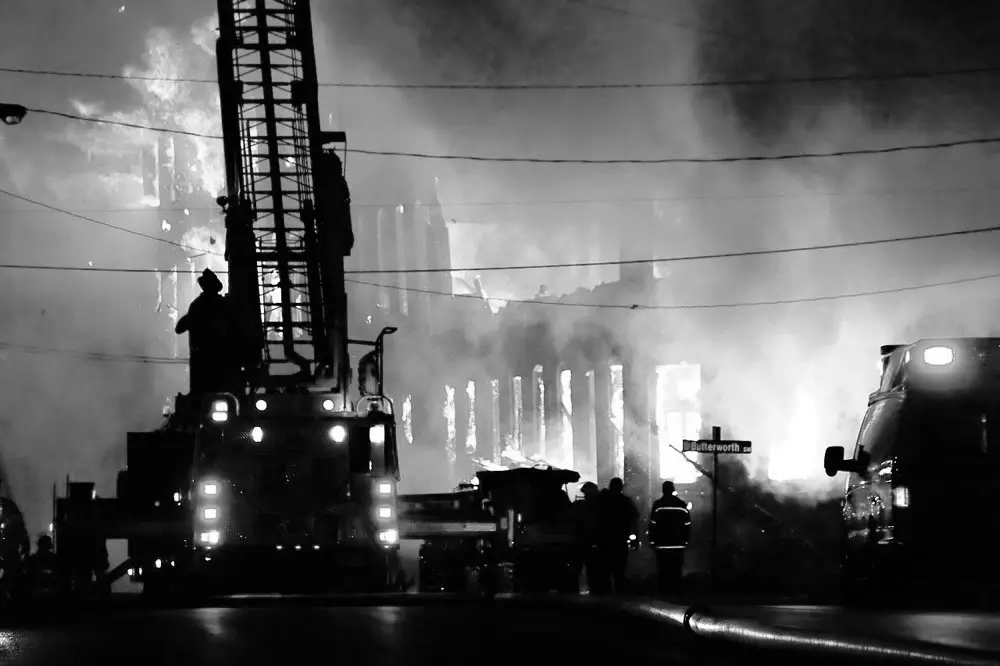
How Does Property Insurance Pay Out After a Fire? How Business & Homeowners Can Avoid Underpaid Claims.
Even a small house fire or partial building fire causing smoke damage, can leave behind extensive damage and expensive repairs. As a Michigan homeowner or commercial property owner, you rely on your homeowners or commercial business property insurance to cover these losses and help you rebuild. But how exactly will your insurance company pay out your fire damage claim? It’s important to understand the payout process — and to recognize that initial offers from insurers are often lower than what you truly need. By knowing your rights and working with experienced Michigan Fire Damage Attorneys, you can avoid the trap of underpaid claims and ensure you receive the full compensation you deserve.
How Insurance Companies Pay Out Fire Insurance Claims
Once you file a fire damage claim, your insurance company will send an adjuster to inspect the damage and estimate the cost of restoration. After this assessment, the insurer will typically offer a settlement amount. In most cases, you receive this insurance payout as a lump-sum check made payable to you (and any mortgage lender on your policy). This means you get the entire agreed-upon amount at once, and you’re responsible for using those funds to cover repair costs, rebuild your home, or replace lost items.
Keep in mind, the insurance company will not pay more than your policy’s coverage limits. If your fire damage costs exceed your coverage limit, the payout will be capped at that limit and you’ll have to pay any remaining repair costs out of pocket. It’s always a good idea to review your policy details so you know how much coverage you have for dwelling, personal property, and other losses.
Also, understand the type of coverage you have. For example, if you carry replacement cost coverage on your home and belongings, the insurer might initially pay you only the actual cash value (ACV) of the damaged property (which deducts depreciation). They will then issue additional payments once you actually repair or replace the items, to reimburse the withheld depreciation. Ultimately, you should receive the full replacement cost — but only if you complete the repairs and follow the policy requirements. Always clarify with your insurance agent or adjuster how your payout will be handled so there are no surprises.
The Insurance Adjuster's Assessment
After a fire, the insurance company’s adjuster will survey the damage to calculate your claim’s value. While adjusters should be thorough and fair, remember that they ultimately represent the insurance company’s interests. Their goal is to minimize the payout wherever possible. An adjuster may unintentionally (or even intentionally) overlook certain damages or underestimate the true cost of repairs. For example, they might write down a cheaper fix for smoke-damaged walls when full replacement is actually needed, or they may undervalue high-end finishes and personal belongings.
This isn’t because adjusters are dishonest; it’s because they are under pressure to control costs for the insurer. The initial damage report and settlement recommendation they provide often lean toward saving the insurance company money. Unfortunately, that can leave you, the homeowner, with a settlement offer that doesn’t fully cover the extent of your fire and smoke damage. It’s important to review the adjuster’s findings critically. If something seems missing or undervalued in their report, you have the right to question it. Many homeowners seek a second opinion or consult professionals (like contractors or fire insurance claim lawyers) to make sure the adjuster’s assessment is accurate and nothing is left out.
Why Many Fire Insurance Claims Are Underpaid
Insurance companies don’t stay profitable by paying out every claim generously. In fact, it’s common for initial settlement offers to be under the true cost of the damage. There are several reasons why fire insurance claims often end up underpaid:
- Cost-Cutting by Insurers: Insurance providers are businesses, and one way they protect their bottom line is by minimizing claim payouts. They might interpret ambiguous policy language in their favor or apply exclusions narrowly to reduce what they owe.
- Incomplete Damage Accounting: Fire damage isn’t always straightforward. There might be hidden structural damage, lingering smoke damage, or water damage from firefighting efforts. If these aspects aren’t thoroughly documented, the insurance settlement might not include funds to address them.
- Low Initial Offers: Insurers often start with a lowball offer expecting that some homeowners will accept it without question. Many people are overwhelmed after a fire and eager to move forward, so they might cash the first check they get — only to realize later it wasn’t enough.
- Policy Complexities and Limits: Your policy might have sub-limits or special conditions (for example, a cap on coverage for certain valuables, or requirements to use specific contractors). If you’re not aware of these, the insurer may stick to the fine print to justify a lower payout.
All these factors contribute to the unfortunate reality that underpayment is a frequent issue in fire damage claims. Without pushing back, a homeowner can easily end up with a check that doesn’t fully cover their needs.
Contesting a Low or Denied Fire Insurance Claim
If the insurance company’s offer doesn’t come close to covering your fire damage costs, you do not have to accept it. As the policyholder, you have the right to contest (appeal) a settlement offer that you believe is unfair. The key is: don’t cash or sign anything if you plan to challenge the payout. Cashing the check or signing a release could be interpreted as accepting the insurer’s offer, making it harder to pursue additional funds.
Instead, notify your insurer that you dispute their valuation. This can kick off a claims dispute process. In some cases, it may involve a second round of reviews or an independent appraisal of the damage. When a claim is outright denied, you similarly have the right to appeal that decision by providing additional evidence or clarification that addresses the reason for denial.
Keep in mind, insurance companies have teams of adjusters and lawyers on their side during these disputes. Going up against them on your own can be overwhelming. This is where having an experienced advocate becomes invaluable. A seasoned fire insurance claim attorney can handle communications with the insurer, gather expert reports or contractor estimates to prove the true scope of damage, and negotiate aggressively on your behalf. If the insurer still refuses to budge, a lawyer can escalate the matter by filing a lawsuit for breach of contract or bad faith, if warranted. Simply put, when you have a legal professional fighting for you, the insurance company is far more likely to take your claim seriously and pay what you are owed.
Maximize Your Fire Insurance Payout with Fabian, Sklar, King & Liss, P.C.
Dealing with a fire insurance claim can be stressful, but you don’t have to go through it alone. At Fabian, Sklar, King & Liss, P.C., we focus on representing policyholders — not insurance companies. Our legal team has successfully handled thousands of fire and smoke damage claims and storm damage insurance claims for policyholders throughout Michigan and around the country. We have secured over an estimated $500 Million in verdicts and settlements in property loss claims. We know the insurance industry’s tactics inside and out, and we are committed to making sure you receive the full benefit of the coverage you paid for.
When you hire our firm, you gain advocates who will fight for your maximum compensation. We will thoroughly document all your fire and smoke-related losses, bring in experts when needed to strengthen your case, and handle all negotiations with the insurer. Our attorneys have over a century of combined experience standing up to insurance companies and have recovered millions of dollars for Michigan families whose claims were initially underpaid or wrongfully denied.
The aftermath of a fire is hard enough without having to battle your insurance company for a fair payout. Don’t let the insurance adjuster pressure you into a mediocre settlement. Instead, put Michigan’s leading fire claim attorneys on your side.
Beyond How Does Property Insurance Pay Out After a Fire? How Business & Homeowners Can Avoid Underpaid Claims, Please find more information on our Insights Blog.
Contact Fabian, Sklar, King & Liss, P.C. today to schedule a free consultation.
We’ll review your claim at no cost, answer your questions, and help you take the next steps to get the insurance payout you deserve.

